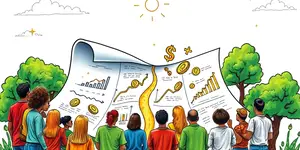In a world where salary figures often command admiration, true financial empowerment stems from the ability to manage money wisely, not just earn it. This article explores why cultivating deep financial awareness delivers lasting stability and peace of mind.
The True Scope of Financial Awareness
Financial awareness encompasses a broad range of competencies, blending theoretical knowledge with hands-on skills. It represents more than a grasp of numbers; it is a holistic mindset for long-term prosperity.
From understanding personal finance concepts to mastering practical skills like budgeting, financial awareness includes confidence, behavior, and resilience. Yet only about one-in-five U.S. adults feel confident across all key money management tasks.
Strong awareness involves recognizing the interplay of interest, inflation, and risk, while developing the habit of regular saving, thoughtful investing, and disciplined debt control.
How Awareness Trumps Income
While a high income may offer immediate comfort, it is the ability to manage that income effectively that creates long-term stability. Recent surveys reveal that even among households earning over $100,000, poor financial decisions can lead to mounting debt and inadequate savings.
These figures demonstrate that income does not guarantee financial savvy. Families with modest earnings who invest in education often achieve greater resilience than high earners with little knowledge.
- Optimized resource allocation enables flexible savings strategies
- Informed decision-making reduces costly mistakes over time
- Emergency fund creation cushions unexpected setbacks
Behavioral and Psychological Impacts
Financial illiteracy often triggers stress, anxiety, and decision paralysis. In fact, 56% of U.S. adults report frequent worry over money, and 42% think about finances daily.
Conversely, those with strong awareness navigate uncertainty with composure, applying effective risk management strategies that calm the mind and protect the wallet.
By shifting focus from income to behavior, individuals develop habits such as tracking expenses, negotiating debt terms, and seeking low-cost borrowing options. These actions directly impact net worth and retirement readiness.
Building Financial Resilience Through Education
Targeted education can lift financial literacy by up to 11 percentage points among low-income groups, delivering outsized benefits compared to equivalent income boosts. Early interventions in schools establish a foundation of competence and confidence.
Community workshops and employer-sponsored seminars reinforce those lessons, ensuring that learning continues into adulthood. This ongoing support fosters lifelong confident decision-making and unlocks the potential for generational wealth building.
Policy Recommendations for Systemic Change
To make financial awareness universal, policymakers and institutions must collaborate on multiple fronts. A comprehensive approach includes both curricular reforms and community outreach.
- Mandate personal finance classes in middle and high schools
- Subsidize accessible adult education programs
- Partner with nonprofits to deliver neighborhood workshops
These initiatives create an environment where knowledge-driven financial security becomes a standard, not a privilege. Embedding financial well-being into public policy strengthens national economic resilience while empowering individuals.
Conclusion: Making Awareness a Priority
True wealth emerges not from high wages but from informed choices, disciplined habits, and strategic planning. By championing financial awareness over raw income figures, we equip ourselves to weather economic storms and seize growth opportunities.
Every step toward deeper understanding builds a foundation that serves individuals across income levels and strengthens entire communities. Start today by committing to learning one new financial concept this week—your future self will thank you.
References
- https://www.pewresearch.org/short-reads/2024/12/09/roughly-half-of-americans-are-knowledgeable-about-personal-finances/
- https://www.weforum.org/stories/2024/04/financial-literacy-money-education/
- https://www.nea.org/resource-library/financial-literacy-economic-inequality
- https://www.opploans.com/oppu/financial-literacy/statistics-financial-literacy/
- https://www.stlouisfed.org/on-the-economy/2018/september/how-americans-rate-financial-literacy
- https://digitalcommons.unomaha.edu/cgi/viewcontent.cgi?article=1064&context=econrealestatefacpub
- https://www.cambridge.org/core/journals/journal-of-financial-literacy-and-wellbeing/article/importance-of-financial-literacy-and-its-impact-on-financial-wellbeing/A5DBBF9D6F0696E5FD3733241EE28E66










